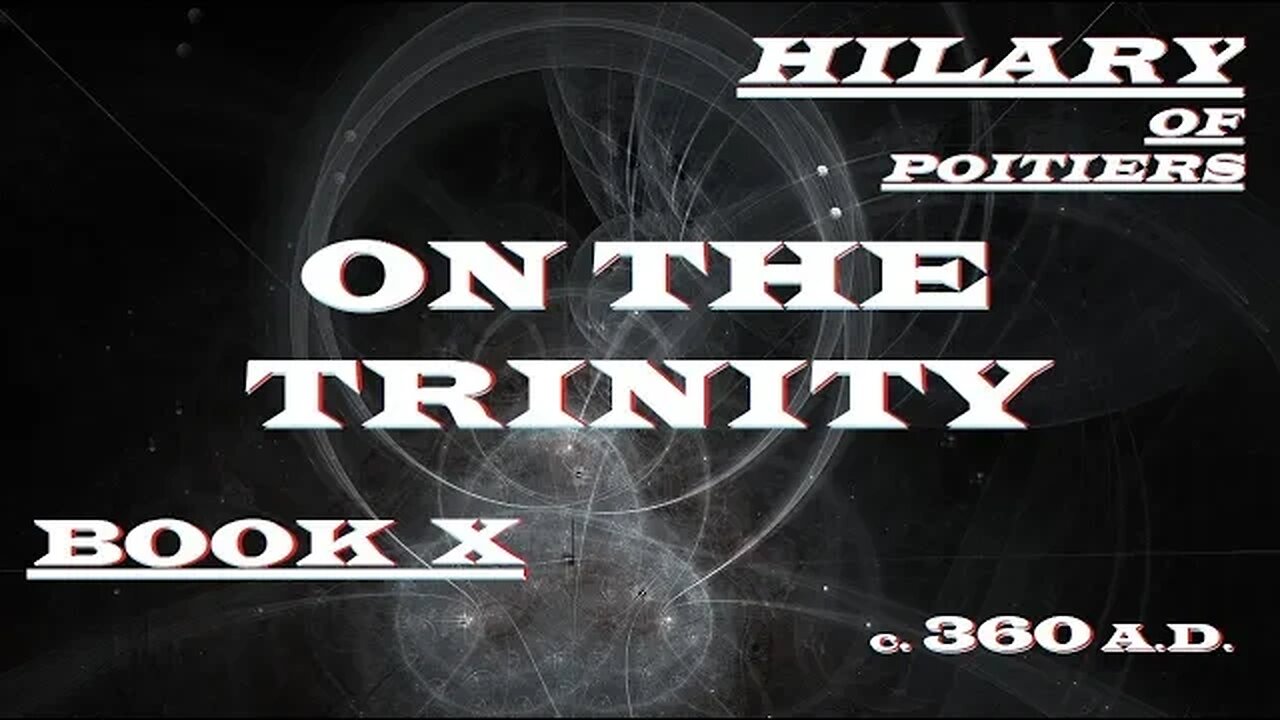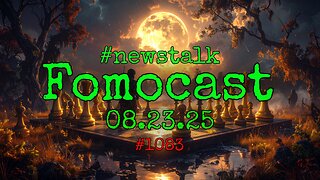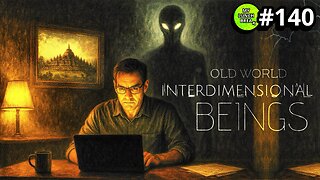Premium Only Content

Hilary of Poitiers - On The Trinity : Book 10 - c. 360 AD
Hilary of Poitiers / Hilarius Pictaviensis / Malleus Arianorum
DE TRINITATE
LIBER X
The purpose of the tenth book is one in harmony with the faith. For since, in the folly which passes with them for wisdom, the heretics have twisted some of the circumstances and utterances of the Passion into an insolent contradiction of the Divine nature and power of the Lord Jesus Christ, I am compelled to prove that this is a blasphemous misinterpretation, and that these things were put on record by the Lord Himself as evidences of His true and absolute majesty. In their parody of the faith they deceive themselves with words such as,
My soul is sorrowful even unto death. ( Matthew 26:38 )
He, they think, must be far removed from the blissful and passionless life of God, over Whose soul brooded this crushing fear of an impending woe, Who under the pressure of suffering even humbled Himself to pray, Father, if it be possible, let this cup pass away from Me , and assuredly bore the appearance of fearing to endure the trials from which He prayed for release; Whose whole nature was so overwhelmed by agony that in those moments on the Cross He cried, My God, My God, why have You forsaken Me ? Forced by the bitterness of His pain to complain that He was forsaken: Who, destitute of the Father's help, gave up the ghost with the words,
Father, into Your hands I commend My Spirit. ( Luke 23:46 )
The fear, they say, which beset Him at the moment of expiring made Him entrust His Spirit to the care of God the Father: the very hopelessness of His own condition forced Him to commit His Soul to the keeping of Another.
Their folly being as great as their blasphemy, they fail to mark that Christ's words, spoken under similar circumstances, are always consistent; they cleave to the letter and ignore the purpose of His words. There is the widest difference between
My soul is sorrowful even unto death ( Matthew 26:38 ),
and Henceforth you shall see the Son of Man sitting at the right hand of power ( Matthew 26:64 );
so also between Father, if it be possible, let this cup pass away, from Me , and
The cup which the Father has given Me, shall I not drink it ( John 18:11 ) ?
and further between
My God, My God, why have You forsaken Me ( Matthew 27:46 )?
and
Verily I say unto you, Today shall you be with Me in Paradise ( Luke 23:43 ), and between Father, into Your hands I commend My Spirit , and Father, forgive them, for they know not what they do ; and their narrow minds, unable to grasp the Divine meaning, plunge into blasphemy in the attempt at explanation. There is a broad distinction between anxiety and a mind at ease, between haste and the prayer for delay, between words of anguish and words of encouragement, between despair for self and confident entreaty for others; and the heretics display their impiety by ignoring the assertions of Deity and the Divine nature of Christ, which account for the one class of His words, while they concentrate their attention upon the deeds and words which refer only to His ministry on earth. I have therefore set out all the elements contained in the mystery of the Soul and Body of the Lord Jesus Christ; all have been sought out, none suppressed. Next, casting the calm light of reason upon the question, I have referred each of His sayings to the class to which its meaning attaches it, and so have shown that He had also a confidence which never wavered, a will which never faltered, an assurance which never murmured, that, when He commended His own soul to the Father, in this was involved a prayer for the pardon of others. Thus a complete presentment of the teaching of the Gospel interprets and confirms all (and not some only) of the words of Christ.
-
 58:59
58:59
MattMorseTV
5 hours ago $0.95 earned🔴Trump just BROKE Newsom.🔴
49.3K49 -
 18:14
18:14
Her Patriot Voice
5 hours agoWho Is WORSE for NYC: Trump Girl or Socialist?
24.2K23 -
 3:39:42
3:39:42
SavageJayGatsby
4 hours agoSpicy Saturday with Mally! | Road to 100 | $300 Weekly Goal for Spicy Bites!
31.3K1 -
 LIVE
LIVE
FomoTV
6 hours ago🚨 Swamp Theater: FBI Raids Bolton 🕵 Still NO Epstein Files, Trump's Troops & the Red Heifer Hoax 🐂 | Fomocast 08.23.25
58 watching -
 6:04:40
6:04:40
Akademiks
9 hours agoRoc Nation & Meg Thee Stallion did a 7 HOUR Deposition with me. Drake Secret Kid Finally Revealed.
49.9K2 -
 24:19
24:19
Stephen Gardner
6 hours ago🚨BREAKING: FBI Raid of John Bolton’s House Reveals THIS!
51.9K122 -
 8:31
8:31
MattMorseTV
8 hours ago $1.10 earnedTexas just did the IMPOSSIBLE.
46.2K60 -
 24:39
24:39
MYLUNCHBREAK CHANNEL PAGE
1 day agoInterdimensional Beings at Borobudur
54.6K27 -
 12:42
12:42
Scammer Payback
1 day agoCalling Scammers who were Raided
25.7K11 -
 23:31
23:31
IsaacButterfield
18 hours ago $0.10 earnedThe Woke Mob Is Really CANCELLING Matt Rife For THIS…
23.4K16